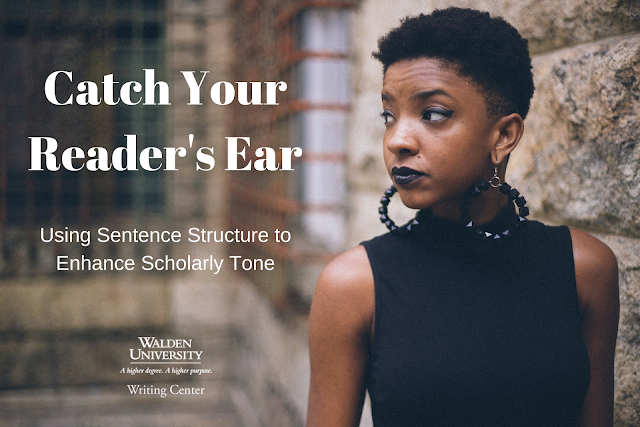Catch Your Reader's Ear: Using Sentence Structure to Enhance Scholarly Tone
Monday, June 04, 2018
Expert Advice
,
Grammar and Mechanics
,
Scholarly Writing
,
Word Choice
,
writing style
6 comments
Scholarly voice is important for several reasons. As a Writing Instructor, I encourage writers to practice clarity of expression and writing concisely in their work, which means that sentences are clear and words are used economically. However, when writers focus solely on these two characteristics of scholarly voice readers can be left with more questions than answers as they read over previous sentences to understand the next sentence.
Ambiguous Subjects Lead to Unclear Sentence Structures
Before discussing the use of ambiguous subjects for sentences, it might help to take a quick refresher on basic sentence structure. The structure for clear and complete sentences is subject à verb à object.
Note: Throughout this post, the highlighting and font styles in the "examples" correspond to the parts of the sentence: yellow highlighting in bold type (subject); green highlighting in underlined type (verb); blue highlighting in italicized type (object).
Example: Nurse practitioners would benefit from emotional intelligence training to ensure that they cultivate a community of trust and respect among nursing staff.
When using this sentence structure, the subject of the sentence, nurse practitioners, is specific; thus, the point is clear for readers. However, what happens when the sentence that follows includes a subject that is more ambiguous?
Example: Nurse practitioners would benefit from emotional intelligence training to ensure that they cultivate a community of trust and respect among nursing staff. It can also support relationships between nurses and their patients.
Wait, what does “it” refer to here? The subject of the last sentence was nurse practitioners, so the use of an ambiguous subject in this sentence makes it hard for readers to know exactly what “it” refers to since “it” doesn’t have a clear antecedent (it is not clearly connected to a subject). “It” could refer to nurse practitioners, but the reader doesn’t know for sure. It could refer to “emotional intelligence.” “It” could refer to “training.” Without a specific subject, the reader is left to guess. And since clear, direct, specific prose are important characteristics of scholarly voice, forcing the reader to guess creates non-scholarly voice.
Instead of referring back to previous terms, topics, and subjects using ambiguous pronouns, I recommend that writers write clear, direct, unquestionable subjects into all of their sentences. “It,” “this,” and “that” might seem like scholarly shortcuts to achieving economy of expression, but be careful. The more your reader has to guess as to what you mean, the less scholarly your writing voice becomes.
Passive Voice Leads to Unclear Sentence Structures
While APA warns about the use of “it” and other less specific subjects for sentences, the style guide also warns about passive voice, which can occur when the subject of the sentence is proceeded by the verb. Structuring sentences in this way creates passive constructions because it is often unclear who or what is acting on the verb For instance, let’s say you want to paraphrase an author:
Example: It was argued that emotional intelligence training can also support relationships between nurses and their patients (Minton, 2018).
Since “it” doesn’t create a clear and specific subject, this sentence is already in danger of falling into the passive voice. We also can’t answer the question “who did the arguing,” which makes the subject of this sentence further obscured. Clearly, the lack of specificity and precision in this sample sentence stands in the way of the reader’s understanding.
Let’s look at how slight changes to the sentence structure can improve the reader’s understanding, thereby enhancing the writer’s scholarly voice. Recall the structure for clear and complete sentences: subject à verb à object
Let’s start by finding a clear subject for this sentence. Since “argued” is our verb, ask yourself, who did the arguing? Yes, Minton! Therefore “Minton,” the author of this information, is a clear and specific subject for our sentence. Let’s move the subject to the fore of the sentence and see how that creates a clearer, more scholarly sentence.
Example: Minton (2018) argued that emotional intelligence training can also support relationships between nurses and their patients.
Notice that not only the subject of the sentence is specific, but the rest of the points in the sentence are specific as well to ensure clarity of expression and connection and flow among points.
Example: Nurse practitioners would benefit from emotional intelligence training to ensure that they cultivate a community of trust and respect among nursing staff (Minton, 2018). Minton (2018) argued that emotional intelligence training for nurses can also support relationships between nurses and their patients.
In conclusion, while the use of some pronouns, such as “it,” are acceptable in APA style scholarly writing, these pronouns need to be clearly connected to a subject within the sentence and should not result in passive voice.
We’d love for you to share with us an example of the appropriate use of “it” in a sentence or let us know what other pronoun use complicates the clarity of a sentence. And stay tuned to the blog in the upcoming weeks as we continue our exploration of scholarly voice and tone.
Veronica Oliver is a Writing Instructor in the Walden Writing Center. In her spare time she writes fiction, binge watches Netflix, and occasionally makes it to a 6am Bikram Yoga class.
.png)
Never miss a new post; Opt-out at any time
Subscribe to:
Post Comments
(
Atom
)





Veronica, your post help clear some issues I have in developing a scholarly voice. Thank you!
ReplyDeleteYou're welcome, Marie! We're glad the post was helpful--APA topics such as scholarly voice can seem like a set of variegated and sometimes confusing rules that need discussion and clarification.
ReplyDeleteVeronica, your post has given me some helpful perspective about academic writing. I do hope to see more of such posts in the future. Thank you.
ReplyDeleteTetteh, thank you for your comment. We hope the perspective this post has given you will be helpful in your future writing. We will strive to publish more posts like this in the future... If you keep reading!
DeleteThanks you very much Veronica for this tip on how to write good sentences to catch the eye of the reader. It is very helpful.
DeleteWe are glad you enjoyed it!
Delete